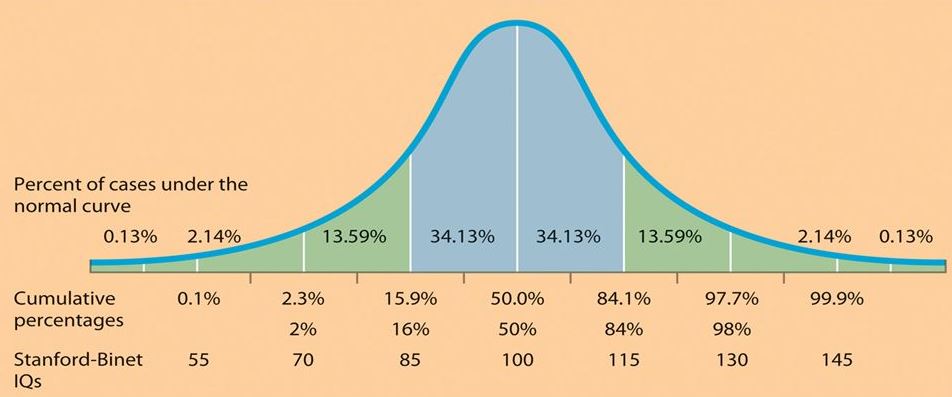- 1. What is IQ?
- 2. What is an IQ Test?
- 3. What IQ Tests measure?
- 4. How IQ is assessed?
- 5. Can IQ increase?
1. WHAT IS IQ?
IQ or Intelligence Quotient is the most researched attempt towards measuring human intelligence and the one with the most practical applications up to date. IQ scores, have been linked to educational
achievement, job performance and even personal income. In general, IQ is considered by many as a
reliable indicator of successful educational, occupational, economic, and social outcomes. Research on IQ has shown that it is a strong predictor of educational and work success than any other single score
2. WHAT IS AN IQ TEST?
The IQ score derives from standardized tests, designed to assess human intelligence. Multiple IQ tests have been developed by several researchers which aim to measure intelligence, focusing on various related skills and attributes, such as verbal skills, mathematical understanding, visual skills,
short-term memory, pattern recognition, analytical thinking, and spatial orientation.
French psychologist Alfred Binet, together with psychologists Théodore Simon and Victor Henri, were the first to publish an IQ test in 1905, (Binet-Simon test). It was designed to measure a child’s intelligence and compare it to what his/her intelligence “should be”, related to the child’s actual age.
Since then, a variety of individually administered IQ tests have been developed and being constantly
updated. Researchers on intelligence have stated that IQ Tests are among the most accurate (in technical terms, reliable and valid) of all psychological tests and assessments
3. WHAT IQ TESTS MEASURE?
IQ tests do not attempt to measure an individual’s general knowledge level, but rather his actual learning capacity. The final IQ score can be an indicator of how capable an individual can be in solving complex problems of (usually) analytical nature. However it can be said that IQ Tests can measure only a particular part of human intelligence, the one linked to logic and analytical thinking. There are aspects of human intelligence such as creativity or emotional intelligence which cannot be measured through an IQ Test.
The OFFICIAL IQ Test is assessing five distinct aspects of human intelligence: 1. Visual Perception, 2. Abstract Reasoning, 3. Pattern Recognition 4. Spatial Orientation. 5. Analytical Thinking,
4. HOW IQ IS ASSESSED?
The IQ test consists of a number of questions designed to measure various areas of intelligence such as visual perception, abstract reasoning, pattern recognition, analytical thinking, and spatial orientation. Once you’ve answered the IQ Test questions your results are compared to the ones from people of your age and then a normalized score is provided.
Normalizing means the average IQ score is 100. Your score will show where you stand compared to other peers in your age group who have taken the test. How far you fall either side of the average IQ score determines roughly how uncommon your IQ is.
IQ scores follow a normal distribution of statistical data. Approximately 95% of the world’s population have scores within two standard deviations (SD) of the mean (average IQ score). If one SD is 15 points, as is common in almost all modern tests, then 95% of the population are within a range of 70 to 130, and 98% are below 131. Alternatively, two-thirds of the population have IQ scores within one SD of the mean; i.e. within the range 85-115.

IQ scales are ordinally scaled. While one standard deviation is 15 points, and two SDs are 30 points, and so on, this does not imply that mental ability is linearly related to IQ, such that IQ 50 means half the cognitive ability of IQ 100. In particular, IQ points are not percentage points*
5. CAN IQ INCREASE?
Recent research has shown that an individual’s IQ Score can significantly change and
There is strong evidence that life as well as learning experiences can have an effect both on the brain and the IQ. Plenty of studies suggest that cognitive training can boost intelligence and it is possible for us to constantly improve the cognitive skills we choose to work on. Human brain has been paralleled by many to a muscle which is being strengthened through practice. Latest neuro research has also confirmed brain’s plasticity and has demonstrated its ability to create new synapses.
Official IQ Test can help you discover your mental strengths and weaknesses and identify areas that you need to work on in order to improve your score!